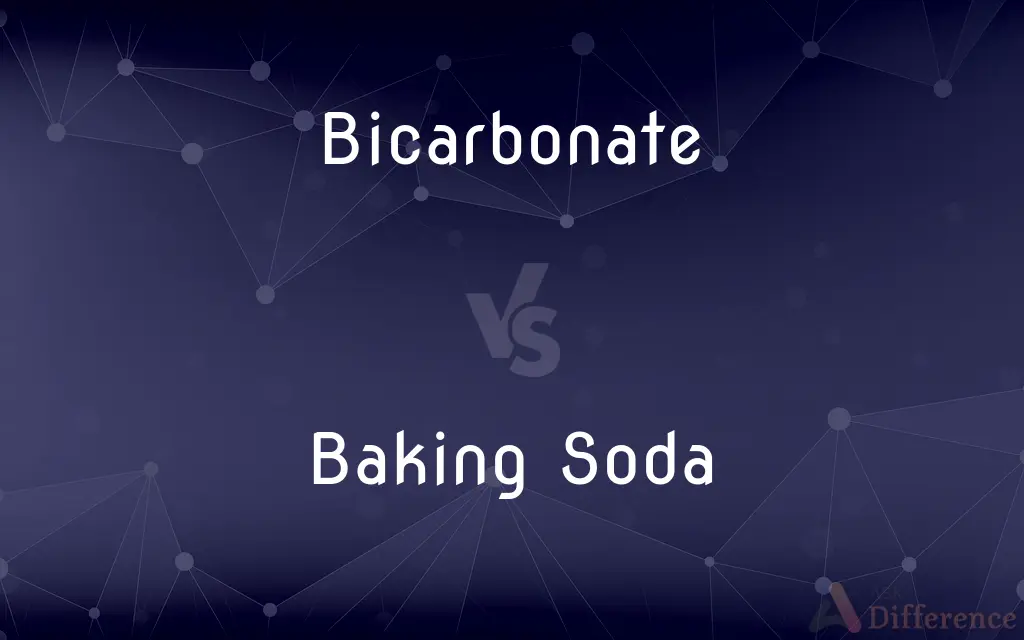Bicarbonate vs. Baking Soda — What's the Difference?
By Tayyaba Rehman — Published on November 16, 2023
Bicarbonate is an anion (HCO3-) and a part of many minerals. Baking soda, also known as sodium bicarbonate (NaHCO3), is a white powder used in cooking and cleaning.

Difference Between Bicarbonate and Baking Soda
Table of Contents
ADVERTISEMENT
Key Differences
Bicarbonate, a term derived from its chemical formula, HCO3-, often appears in various biological and chemical contexts, reflecting its widespread natural occurrence and multiple functionalities. Baking soda, whose scientific name is sodium bicarbonate, is a salt composed of sodium ions and bicarbonate ions and is often used in cooking, cleaning, and other applications due to its alkaline properties.
While bicarbonate plays crucial roles in various physiological processes, such as maintaining pH balance in the blood, baking soda is known for its practical uses in daily life, including neutralizing odors, acting as a leavening agent in baking, and cleaning surfaces. These two terms, although chemically related, have distinctive implications based on their specific contexts and applications.
Bicarbonate exists naturally in mineral and aquatic environments, contributing to the mineral carbonation process and the ocean's carbonate buffering system, respectively. Conversely, baking soda is frequently found in households and industrial settings, facilitating diverse applications like extinguishing small grease or electrical fires and being utilized in certain medical practices for its antacid properties.
Bicarbonate's presence in our bodies is vital for physiological pH regulation, ensuring our bodily functions operate optimally within a narrow pH range. Baking soda, on the other hand, has been utilized externally in various health and beauty regimens, such as tooth whitening and skin exfoliation, showcasing its versatility in different domains.
In an environmental context, bicarbonate can act as a sink for atmospheric CO2, while baking soda, due to its alkaline nature, has the potential to neutralize acidic substances, displaying how both, in their respective ways, can interact with and moderate their surrounding environments.
ADVERTISEMENT
Comparison Chart
Definition
An anion (HCO3-)
Sodium bicarbonate (NaHCO3)
Common Use
PH regulation
Baking and cleaning
Natural Occurrence
Yes
No (manufactured)
In Biological Systems
Regulates body pH
Used externally/medically
In Environmental Role
Absorbs atmospheric CO2
Neutralizes acids
Compare with Definitions
Bicarbonate
Bicarbonate is a negatively charged ion consisting of one hydrogen, one carbon, and three oxygen atoms.
Seawater contains bicarbonate, contributing to its buffering capacity.
Baking Soda
Baking soda is a white crystalline powder used as a leavening agent in baking.
I added baking soda to the cookie dough to make it rise.
Bicarbonate
In physiology, bicarbonate acts as a crucial component in maintaining blood pH.
Our kidneys regulate bicarbonate levels to ensure optimal body functioning.
Baking Soda
In fire safety, baking soda can be used to extinguish small grease or electrical fires.
I threw baking soda onto the stovetop fire, and it was quickly extinguished.
Bicarbonate
In chemistry, bicarbonate serves as an intermediate form in the carbonate buffering system.
Carbonic acid dissociates into bicarbonate and a hydrogen ion in water.
Baking Soda
Baking soda is utilized in household cleaning due to its abrasive and neutralizing properties.
I cleaned the stained coffee pot with baking soda and water.
Bicarbonate
Bicarbonate can act as a substrate in various enzymatic reactions.
Carbonic anhydrase speeds up the conversion of CO2 to bicarbonate in red blood cells.
Baking Soda
Baking soda is commonly used as a deodorizer due to its ability to neutralize odors.
Placing a box of baking soda in the fridge will help absorb unwanted smells.
Bicarbonate
Bicarbonate can form naturally occurring minerals when combined with metal ions.
Calcite, a calcium carbonate mineral, may contain bicarbonate under certain conditions.
Baking Soda
Chemically, baking soda is referred to as sodium bicarbonate.
Baking soda, or sodium bicarbonate, helps neutralize stomach acid when ingested.
Bicarbonate
The polyatomic anion HCO3- or a compound, such as sodium bicarbonate, containing it.
Bicarbonate
(chemistry) the univalent anion HCO3-; any salt of carbonic acid in which only one of the hydrogen atoms has been replaced.
Bicarbonate
Sodium bicarbonate used as a mild antacid; bicarbonate of soda
Bicarbonate
A carbonate in which but half the hydrogen of the acid is replaced by a positive element or radical, thus making the proportion of the acid to the positive or basic portion twice what it is in the normal carbonates; an acid carbonate; - sometimes called supercarbonate.
Bicarbonate
A salt of carbonic acid (containing the anion HCO3) in which one hydrogen atom has been replaced; an acid carbonate
Common Curiosities
How does baking soda get its name?
Baking soda gets its name from its common use as a leavening agent in baking.
Can baking soda be used for cleaning purposes?
Yes, baking soda is often used to clean, deodorize, and unclog drains due to its mild abrasive nature.
What is bicarbonate in simple terms?
Bicarbonate is a negatively charged chemical ion (HCO3-) involved in various biological and chemical processes.
What is the role of bicarbonate in the carbon cycle?
Bicarbonate helps regulate atmospheric CO2 levels by forming carbonate minerals.
Is baking soda edible?
Yes, baking soda is edible and is often used in cooking and baking.
Is it safe to consume baking soda directly?
Yes, but in small amounts, as large quantities of baking soda can be harmful.
Why is bicarbonate important biologically?
Bicarbonate helps maintain pH balance in organisms, essential for various metabolic processes.
Does bicarbonate naturally occur in nature?
Yes, bicarbonate is found in nature, including in mineral springs and seawater.
Can I replace baking powder with baking soda in recipes?
Yes, but with caution, as you may need to add an acid (like vinegar) to activate the baking soda.
Is bicarbonate the same as baking soda in cooking?
Not exactly, bicarbonate refers to the HCO3- ion, while baking soda is sodium bicarbonate, a compound used in cooking.
Can bicarbonate be formed in biological systems?
Yes, bicarbonate is formed in biological systems, like during cellular respiration in our bodies.
What is the chemical formula of baking soda?
The chemical formula of baking soda is NaHCO3.
Can bicarbonate be used to neutralize acids?
Yes, bicarbonate can act as a buffer, neutralizing acids in various contexts.
Are bicarbonate levels in the body regulated?
Yes, bicarbonate levels are tightly regulated, especially by the kidneys, to maintain pH balance.
Can baking soda be used in medical applications?
Yes, baking soda is used in various medical applications, such as an antacid and to treat certain conditions.
Share Your Discovery

Previous Comparison
Percent Abundance vs. Relative Abundance
Next Comparison
Portfolio vs. ResumeAuthor Spotlight
Written by
Tayyaba RehmanTayyaba Rehman is a distinguished writer, currently serving as a primary contributor to askdifference.com. As a researcher in semantics and etymology, Tayyaba's passion for the complexity of languages and their distinctions has found a perfect home on the platform. Tayyaba delves into the intricacies of language, distinguishing between commonly confused words and phrases, thereby providing clarity for readers worldwide.












































